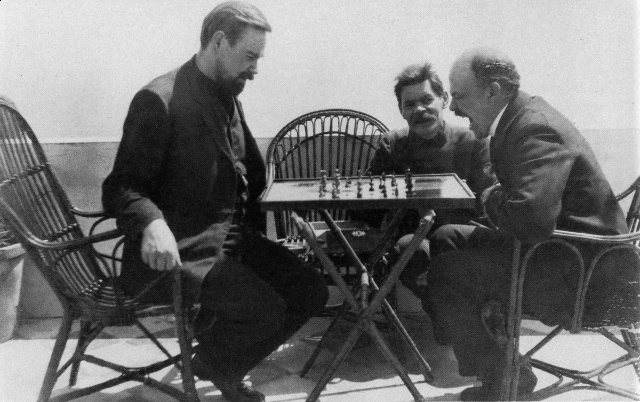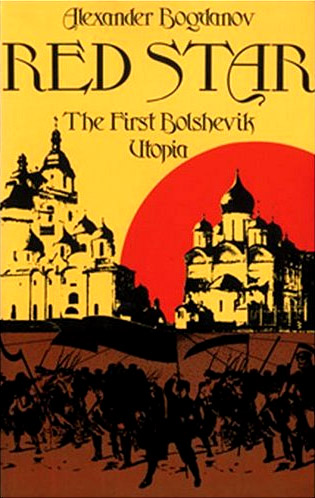Alexander Bogdanov: Tektology (1913–) [Russian, English]
Filed under book | Tags: · cognition, marxism, organization, philosophy, science, systems theory, tektology

Bogdanov playing chess with Lenin during a visit to Gorky on Capri, Italy, April 1908. (source)
Tektology is a term used by Alexander Bogdanov to describe a discipline that consisted of unifying all social, biological and physical sciences by considering them as systems of relationships and by seeking the organizational principles that underlie all systems.
Bogdanov’s work on tektology, published in Russia in two volumes in 1913 and 1917, anticipated many of the ideas that were popularized later by Norbert Wiener in Cybernetics and Ludwig von Bertalanffy in the General Systems Theory. There are suggestions that both Wiener and von Bertalanffy might have read the German edition of Tektology which was published in 1928. (from Wikipedia)
In Bogdanov’s philosophical endeavours there was one very important motive: from his point of view the philosophy of Marxism should be a philosophy of modern natural science and in this respect he acted in full accordance with Engels’ thesis that “with each epochal discovery, even in the natural-historical field, materialism should inevitably change its form.” (from the Foreword)
English edition
Publisher Intersystems Publications, Seaside/CA, 1980
265 pages
Russian edition
First published as The Universal Science of Organization (Tektologia), 1913-1917
This edition: Tektologia: Universal Organizational Science
Publisher Ekonomika, Moscow, 1989
303 and 352 pages
English edition
Foreword by Vadim N. Sadovsky and Vladimir V. Kelle
Edited with an Introduction by Peter Dudley
Translated by Vadim N. Sadovsky, Andrei Kartashov, Vladimir V. Kelle and Peter Bystrov
Publisher Centre for Systems Studies, University of Hull, 1996
ISBN 0859588769
322 pages
via Ken
Aleksandr Bogdanov and Systems Theory (Arran Gare, Democracy & Nature, 2000)
Against Social Determinism (McKenzie Wark, Public Seminar, 2013)
Essays in Tektology (English, trans. George Gorelik, 1980, added on 2013-12-23, via Marcell Mars)
Essays in Tektology, 2nd ed. (English, trans. George Gorelik, 1984, added on 2014-3-25, via Marcell Mars)
Тектология. Всеобщая организационная наука. том 1 (Russian, 1989, DJVU)
Тектология. Всеобщая организационная наука. том 2 (Russian, 1989, DJVU)
Bogdanov’s Tektology, Book 1 (English, trans. Vadim N. Sadovsky et al, 1996)
See Monoskop wiki for further writings of Bogdanov.
Comments (2)Alexander Bogdanov: Red Star: The First Bolshevik Utopia (1908–) [FR, EN, DE]
Filed under fiction | Tags: · communism, marxism, proletariat, science fiction, utopia

A communist society on Mars, the Russian revolution, and class struggle on two planets is the subject of this arresting science fiction novel by Alexander Bogdanov (1873–1928), one of the early organizers and prophets of the Russian Bolshevik party. The red star is Mars, but it is also the dream set to paper of the society that could emerge on earth after the dual victory of the socialist and scientific-technical revolutions. While portraying a harmonious and rational socialist society, Bogdanov sketches out the problems that will face industrialized nations, whether socialist or capitalist.
The book also includes Engineer Menni, a historical novel about the social revolution on Mars, first published in 1913, and the poem A Martian Stranded on Earth, first published as a supplement to the second edition of Red Star in 1924, about a Martian who has reached Earth but is unable to return to his native planet. where mankind has attained a superior level of communist civilization.
Edited by Loren R. Graham and Richard Stites
Translated by Charles Rougle
Publisher Indiana University Press, 1984
ISBN 0253173507, 9780253173508
257 pages
Reviews: Andy Cunningham (Socialist Review), Paul Josephson (Technology and Culture).
L’Étoile rouge (French, 1913-14, HTML, added on 2014-3-27)
Red Star (English, trans. Charles Rougle, 1984)
Der rote Planet (German, undated, HTML, added on 2014-3-27)
See Monoskop wiki for further writings of Bogdanov.
Comments (6)R. Bruce Elder: Harmony and Dissent: Film and Avant-garde Art Movements in the Early Twentieth Century (2008)
Filed under book | Tags: · abstract cinema, art history, avant-garde, cinema, colour, constructivism, dissent, experimental film, film, film history, film theory, marxism, modernism, music, occultism, productivism, revolution, suprematism, symbolism, theology

“R. Bruce Elder argues that the authors of many of the manifestoes that announced in such lively ways the appearance of yet another artistic movement shared a common aspiration: they proposed to reformulate the visual, literary, and performing arts so that they might take on attributes of the cinema. The cinema, Elder argues, became, in the early decades of the twentieth century, a pivotal artistic force around which a remarkable variety and number of aesthetic forms took shape.
To demonstrate this, Elder begins with a wide-ranging discussion that opens up some broad topics concerning modernity’s cognitive (and perceptual) regime, with a view to establishing that a crisis within that regime engendered some peculiar, and highly questionable, epistemological beliefs and enthusiasms. Through this discussion, Elder advances the startling claim that a crisis of cognition precipitated by modernity engendered, by way of response, a peculiar sort of “pneumatic (spiritual) epistemology.” Elder then shows that early ideas of the cinema were strongly influenced by this pneumatic epistemology and uses this conception of the cinema to explain its pivotal role in shaping two key moments in early-twentieth-century art: the quest to bring forth a pure, “objectless” (non-representational) art and Russian Suprematism, Constructivism, and Productivism.”
Publisher Wilfrid Laurier University Press, Waterloo, 2008
ISBN 1554580285, 9781554580286
480 pages
Review: David Sterritt (Quarterly Review of Film and Video, 2011).
PDF (updated on 2019-12-14)
Comments (7)
